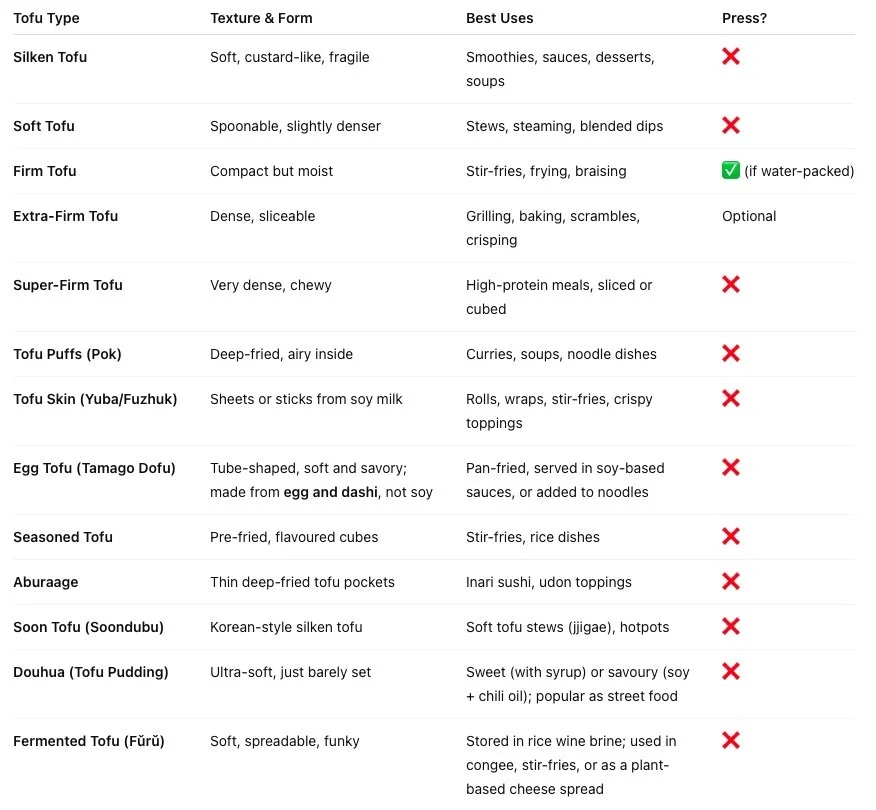Tofu for Beginners: Types, Cooking Tips and Prep Guide
Tofu might seem mysterious at first—bland, wobbly, and unfamiliar—but it’s one of the most transformative ingredients in plant-based cooking. With the right guidance, tofu turns into something crispy, creamy, chewy, or silky. And more importantly, it becomes a tool for nourishment, sustainability, and joyful experimentation.
This guide is your beginner’s compass: helping you navigate tofu types, choose the right prep method, and cook with more confidence—no rigid recipes required.
🧱 What Is Tofu?
Tofu, or bean curd, is made by curdling fresh soy milk and pressing the curds into blocks—very much like a plant-based cheese. It’s been part of Asian culinary traditions for over 2,000 years and remains a daily staple in homes across China, Japan, Korea, Vietnam, and beyond.
At its core, tofu is:
Protein-rich (10–20g per 100g depending on type)
Cholesterol-free
Low in saturated fat
A complete protein (with all essential amino acids)
Often high in calcium, especially when made with calcium sulfate (gypsum)
Its mild flavour and adaptable texture mean it can soak up marinades, take on bold sauces, and transform completely depending on how you prep and cook it.
🧠 Did You Know? The coagulant used to make tofu matters:
Calcium sulfate (gypsum) boosts calcium content significantly.
Nigari (magnesium chloride) creates a silkier texture but less calcium.
🧾 Tofu Nutrition Snapshot (per 100g)
*Calcium content varies by coagulant.
📌 Note: Per-100g nutrition values for less common types (e.g. tofu puffs, yuba, seasoned tofu) are general estimates based on moisture loss and known composition ranges. Precise data may not be available in all cases. For accuracy, consult packaging or product-specific info.
🍥 Tofu Types Around the World: A Global Snapshot
Tofu isn’t just soft or firm—it’s a global culinary tradition with a wide range of textures and uses. Here's a broader look at how tofu appears in kitchens across the world:
🥚 Note: Despite its tofu-like texture, egg tofu contains no soy. It highlights how “tofu” can refer to form or texture—not always soy-based content. Not suitable for plant-based diets.
🌏 Tofu is more than a meat alternative—it's a cultural canvas. Exploring global varieties helps deepen your connection to this ancient, adaptable food.
🔧 Do You Really Need to Press Tofu?
The short answer: sometimes. But not always. Pressing tofu helps remove excess moisture and improve texture—especially for frying or grilling. But pressing isn't a must for every dish or tofu type.
✅ When Pressing Helps
❌ When NOT to Press
🧪 Science Spotlight: Texture & Absorption
📦 Why Freeze Tofu First?
Freezing tofu forms ice crystals inside. When thawed, they leave behind holes—making tofu spongier and meatier. It soaks up marinades better and chews more like meat.
🔥 Why High Heat Matters for Browning
Tofu browns via the Maillard reaction, which starts at around 150°C (302°F). If the tofu is wet, it just steams. Dry surface + high heat = golden, crispy goodness.
🔥 Cooking Techniques & Tips
Marinating
Tofu absorbs best when:
Dry (pressed or patted down)
Hot (cook it in the sauce or marinade)
Porous (freeze–thaw makes a huge difference)
Cornstarch for Crispiness
Dusting tofu in cornstarch or arrowroot before frying or baking creates a dry surface. As it heats, moisture escapes as steam, forming a delicious crust.
Blotting vs Pressing
In quick meals, blotting tofu dry with a towel is often good enough—especially if you’re coating it or baking.
🍽 Tofu Serving Ideas to Try Tonight
No complex recipes needed—just ideas you can riff on:
🥢 Crispy Tofu Stir-Fry
Cube and toss firm tofu in cornstarch. Pan-fry till golden. Add veg and a soy-ginger-garlic glaze.
🧄 Baked Tofu Bites
Marinate extra-firm tofu in soy sauce, garlic powder, and smoked paprika. Bake at 190°C (375°F) for 25–30 mins.
🥤 Silken Tofu Smoothie
Blend silken tofu with banana, berries, and plant-based milk. Add maple syrup if desired.
🍳 Tofu Breakfast Scramble
Crumble extra-firm tofu into a pan with turmeric, black salt, sautéed onion, and spinach.
🥗 Rice Noodle Tofu Bowl
Sear marinated tofu slices. Serve with rice noodles, herbs, cucumber, and a sesame-lime dressing.
🌍 Why Tofu Is a More Sustainable Protein
Tofu isn't just good for your body—it’s good for the planet. Here's how it stacks up compared to beef:
Just one tofu swap a week can make a meaningful dent in your environmental footprint. A kinder plate, one meal at a time.
💚 Final Takeaway
Tofu doesn’t need perfection—it just needs curiosity. With one good block and a few smart tips, you can turn it into something tender, bold, creamy, or crisp.
Whether you're plant-curious or full-on soy-powered, every tofu meal you make builds skill, confidence, and a more sustainable future.
Tofu isn’t just a food—it’s a quiet revolution on your plate.
Let’s tofu-fy the world. 🌱✨






